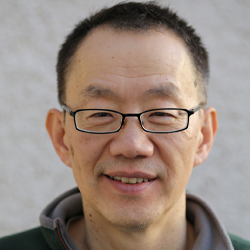
About
Morgan Sheng is a Core Institute member of the Broad Institute of MIT and Harvard, where he serves as Co-Director of the Stanley Center for Psychiatric Research. He is also a Professor in MIT’s Department of Brain and Cognitive Sciences, and an affiliate of the Picower Institute for Learning and Memory and the McGovern Institute for Brain Research.
Professor Sheng was on the faculty of the Department of Neurobiology at Massachusetts General Hospital and Harvard Medical School (1994-2001) before joining MIT in 2001. He was the Menicon Professor of Neuroscience at MIT from 2001-2008, and an investigator of the Howard Hughes Medical Institute from 1994-2008. From 2008 to 2019, Sheng was Vice-President of Neuroscience at Genentech, a leading biotech company, where he led research and drug discovery for major diseases of the nervous system.
Professor Sheng is an elected Member of the National of Medicine (USA), Fellow of the Royal Society (UK), Fellow of the Academy of Medical Sciences (UK), and Fellow of the American Association for the Advancement of Science (USA). He has received the Julius Axelrod Prize and the Young Investigator Award of the Society for Neuroscience, as well as the Fondation Ipsen Prize in Neuronal Plasticity. He serves or has served on the editorial boards of Neuron, Journal of Neuroscience, and Current Opinions in Neurobiology.
Professor Sheng received a B.A. (1st class honors) from Oxford University and obtained his medical degree and training at London University. He completed his Ph.D. at Harvard Medical School in the lab of Michael Greenberg, and his postdoctoral research in the lab of Lily Jan at the University of California, San Francisco.
Research
A physician-scientist, Morgan Sheng is author of more than 200 peer-reviewed publications focused on the molecular and cell biology of synapses and synaptic plasticity, and the pathogenic mechanisms of neurodegenerative and psychiatric disorders. Sheng’s molecular studies of the structure and function of synapses (the communication junctions between brain cells) while at MGH and MIT have enhanced our understanding of the neural basis of brain function and dysfunction, including learning and memory, neurodevelopmental disorders, psychosis and dementia. His work has uncovered the form and complexity of protein complexes in the postsynaptic membrane that regulate the remarkable plasticity of neuronal connections.
At Genentech, Dr. Sheng built and led a world-class neuroscience department and research program focused on elucidating pathologic mechanisms and developing new treatments for neurodegenerative diseases and pain, while illuminating pathways that are of basic scientific interest as well as therapeutic relevance. Sheng and coworkers made important discoveries regarding the molecular mechanisms of synapse weakening and loss, the contributions of microglia and innate immunity in neurodegenerative diseases, and the roles of genetic risk factors in the pathogenesis of Alzheimer’s disease, Parkinson’s disease, ALS, and frontotemporal dementia.
Currently, as Co-Director of the Stanley Center for Psychiatric Research at the Broad Institute, Sheng leads the center’s efforts to understand the molecular-genetic and neurobiological mechanisms underlying schizophrenia and bipolar disorder, and to develop therapeutics for these serious mental illnesses.

